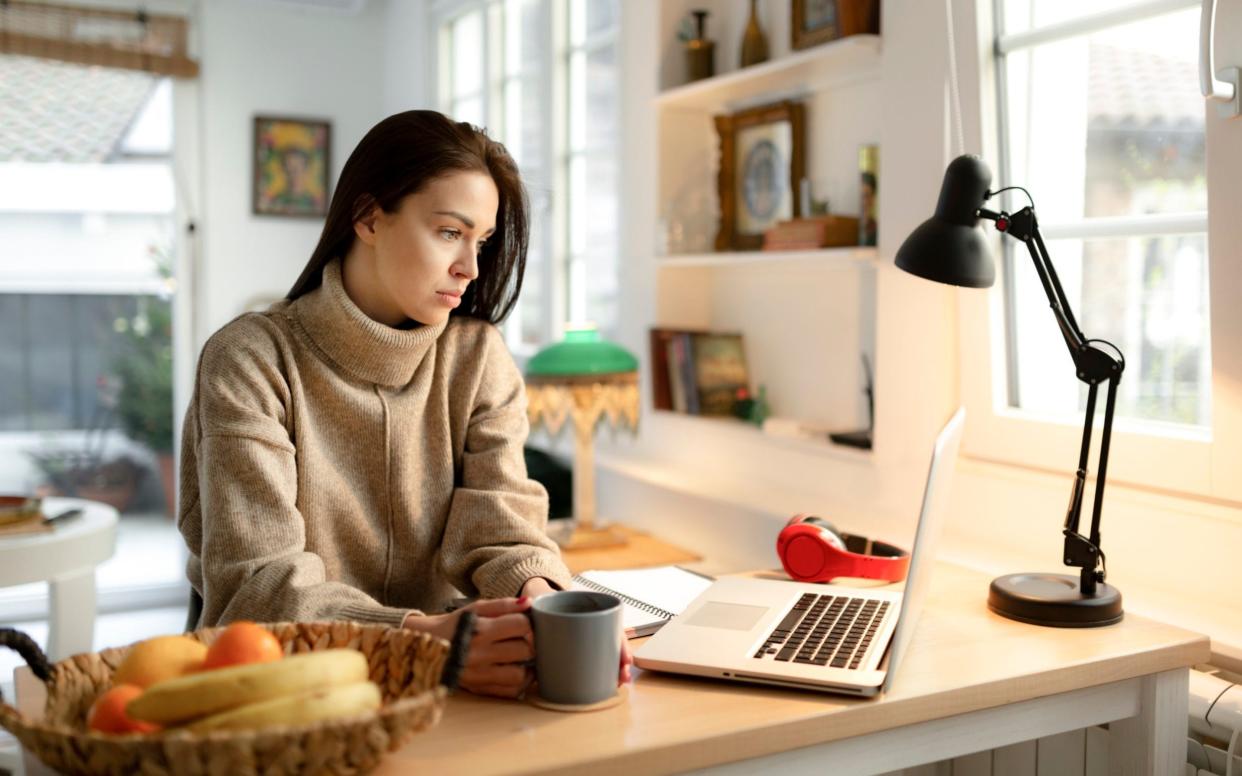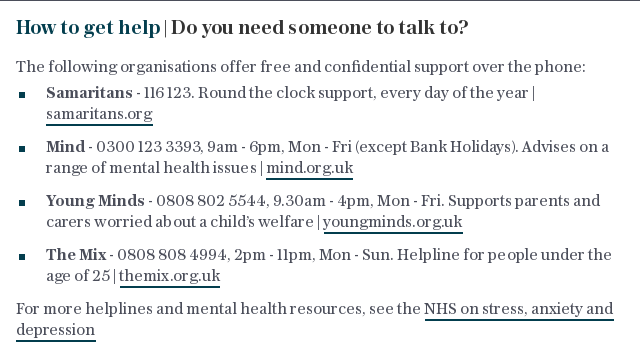Mental Health Awareness Week: does online therapy work?


These are challenging times for our mental health. The coronavirus pandemic and the uncertainty around our health, our loved ones, a change to our routine and job insecurity has left many of us feeling anxious. Last week, health experts at the United Nations warned there could be a mental illness crisis on the horizon.
Paradoxically, being in lockdown has also given us the chance to face our mental health head-on, with some of us reaching out for professional help, sometimes for the first time.
Mental health services have largely shifted to online. Current figures show that the number of therapists offering online services on Counselling Directory has grown from 9,839 on 16 March to 13,593 last week, perhaps in response to lockdown.
New clients have approached Jerilee Claydon, a clinical psychotherapist, describing feeling anxious for the first time, despite leading hectic lives. “Would these clients have sought therapy at some other stage in life? Perhaps,” Claydon says, “but without the nudge of lockdown it’s unlikely they would have addressed their unhealthy coping strategies, with life so full of distractions.”
Lockdown has been a “turning point” for Emily Nuttall, a 26-year-old student from Guernsey, who has been seeing a psychologist to treat her anxiety and anorexia since 2017, and switched to telephone appointments in February this year. “Although lockdown has been hard, it also made me realise I haven't dealt with a lot of stuff,” she says. Usually, she leads a busy life, but she says lockdown has made her sit down and stop. As a result, she is now focusing more on her treatment and using online resources.
There has been a steady stream of demand for therapy during lockdown, according to Dr Rachel Allan, a counselling psychologist who now sees most of her clients on Zoom. However, there might be an increased demand for services in the aftermath too, according to Frances Taylor, a counsellor with Counselling Directory, who describes this time as the “quiet before the storm”.
There has been a decrease in emergency and routine presentations in people with eating disorders, which is “concerning”, says Professor Sandeep Ranote, Greater Manchester clinical director for mental health and paediatric psychiatrist in eating disorders. “Lockdown and Covid does not mean eating disorders have disappeared.”
She says there could be a spike in referrals when children go back to school, and worries what will happen three to nine months down the line, as “the psychological impact of Covid is still yet to be really realised”. Professor Ranote urges those struggling to reach out. Online therapy and psychiatric assessments are now available online (although some might also need an in-person physical examination, which is still available.)
But how effective is virtual therapy? The following are the perks and pitfalls off online and telephone therapy and counselling, according to mental health professionals and those receiving help.
Positives of virtual therapy
One of the main perks of online therapy is you can do it from the comfort of your own home. Not only is this more convenient, but it could enhance the quality of your sessions, according to Relate couples counsellor Simone Bose, who finds couples are “a little bit more relaxed because they’re in their own space”.
This is true of Sarwar Khan, 37, and his partner of eight years, Farideh Lappage, 42. The couple have been in counselling since November, as they were having communication issues, but switched to Zoom calls in mid-March. It has worked for them, according to Khan. “From the comfort of your home, you’re a bit more relaxed, naturally less guarded and more willing to open up,” he says.
Face-to-face discussion can be intimidating, according to Dr Allan. “If you are exposing something where perhaps there’s a fear of judgement or there’s raw emotion, doing that with another individual in front of you might just feel overly threatening,” she explains. Online therapy, by contrast, feels “safe”.
This has been the case for Julia Portelly, 26, who has been having CBT with a therapist over Zoom for the past six months to combat stress and anxiety. “Seeing someone over video, it’s a lot less intimate,” she says, “so you can have your little cry, you can take as many notes as you need to, and draw diagrams, and you don’t feel like you’re under so much pressure.”

Potential issues
Nonetheless, online therapy is not perfect. Firstly, there’s the issue of privacy. If your home has thin walls or your windows are open, you might worry that your family, housemates or neighbours can overhear your conversation with your therapist. “If you’re talking and you feel like they can hear you, then it affects how you open up in sessions,” says Bose. Portelly has found this an issue with her housemates.
You might also have issues with internet connection or, more importantly, getting an intimate connection, according to Dr Allan. “The value of being in a room in a physical space with somebody, a shared space, and the depth of connection that can be achieved there. I don’t think online therapy can rival that.”
Emily Nuttall has found it “really hard to adjust” to telephone appointments with her psychologist. “I sometimes struggle to express how I feel because I think an eating disorder is quite a secretive illness,” she says.
On the phone, she might not tell the whole truth to her therapist, she admits. “I might not be able to find the words and just say I'm fine. Whereas if I’m in person my mask is off and I start to reveal a bit more about what I’m thinking or feeling.”
However, she says she is grateful to her psychologist for still being available, and that he has “really helped”. Even so, when the pandemic is over she wants to go back to face-to-face therapy.
She’s not alone. From a therapist’s point of view, it can be easier when a client is in front of them. Body language is “not so pronounced, perhaps, when the connection is through a screen,” Dr Allan says. This means you are “depending much more on the verbal communication of the client than you are when they’re face-to-face”.
This can be even more challenging over the phone, according to Peter Klein, a psychotherapist on Counselling Directory, who offers telephone and video counselling. “Over the phone, of course the disadvantage is that I can’t see the movements that they’re doing, so I can’t see if someone is responding emotionally to what I’m saying,” he says. “So some of the information gets missed.”
Nonetheless, he argues that telephone appointments “tend to flow better” than Zoom calls. “People are less self-conscious because there’s no camera,” he says, “and they focus much more on the content of their thoughts or expressing what’s bothering them, instead of how they come across”.
Is virtual therapy the future?
Online therapy has been a “revelation” for Dr Allan and she, Taylor and Bose have all said they will try to incorporate more remote sessions even after the pandemic. Bose believes there will be “more of an uptake for it” after lockdown, especially for those with children or who work from home.
Portelly is one of the converted. While she had face-to-face counselling five years ago, she now prefers her Zoom calls. “I wouldn’t go back,” she says. “This is perfect.” She says her sessions have made her “more balanced and a lot more positive” and have given her the tools to deal with bad days. “I would recommend it to anybody.”
Not everyone is convinced. “I think face-to-face sessions are still more effective because you get the whole picture of the person,” says Klein. "When there’s no camera there, it seems easier - especially for anxious clients - to get in a flow state, where they can just talk about their problems.”
Going forward, the answer perhaps lies in a mixture of in-person and virtual offerings.
Tips for getting the most out of online therapy
Firstly, you should make yourself comfortable. Portelly recommends “sitting somewhere that’s nice and warm”, perhaps with a hot water bottle and blanket. While you should strive for comfort, “being in bed in your pyjamas might stop you from focusing,” according to Louise Chunn, who now runs the therapy website, welldoing.org.
On a logistical point, you should position your camera so the therapist can see a bit of your body (especially your hands), as this makes it “easier to gauge reactions,” according to Klein.
Your therapist can help too, by describing their setting. Khan and Lappage’s counsellor described the room he was in, and asked the couple to describe their living room, which “put us at ease,” Khan says.
During your session it might be worth taking notes. “When I’m in my sessions, I’m usually quite upset so I might forget what exactly it is that I was talking about,” Portelly explains. Taking notes has really helped her. “Scribble down whatever nonsense you want - you can always make sense of it later,” she advises.


